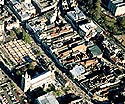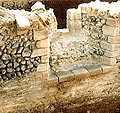![]() Norwich
Norwich

 Norwich,
the largest city in East Anglia in medieval times, developed out of a number
of small Anglo-Saxon settlements clustered around the lowest fordable point
on the River Wensum before the sea c. 32 km (20 miles) away. By the
time of the Norman Conquest (1066) Norwich had 1320 burgesses and was the
third largest town in England. The conquest appears, however, to have had
a drastic impact on Norwich. For example, the Domesday Book (1086) suggests
a fall of about a half in the number of burgesses. In addition, the construction
of the castle by Ralph, Earl of East Anglia, involved destruction of 98 houses
and at least two churches. By 1100 the castle extended over 5.6 ha (14 acres)
in the heart of the city. Earl Ralph also created a new urban zone west of
the castle, known as the French borough. This was focused on what is now the
market place, and it accommodated a number of immigrant merchants.
Norwich,
the largest city in East Anglia in medieval times, developed out of a number
of small Anglo-Saxon settlements clustered around the lowest fordable point
on the River Wensum before the sea c. 32 km (20 miles) away. By the
time of the Norman Conquest (1066) Norwich had 1320 burgesses and was the
third largest town in England. The conquest appears, however, to have had
a drastic impact on Norwich. For example, the Domesday Book (1086) suggests
a fall of about a half in the number of burgesses. In addition, the construction
of the castle by Ralph, Earl of East Anglia, involved destruction of 98 houses
and at least two churches. By 1100 the castle extended over 5.6 ha (14 acres)
in the heart of the city. Earl Ralph also created a new urban zone west of
the castle, known as the French borough. This was focused on what is now the
market place, and it accommodated a number of immigrant merchants.
In 1075 Earl Ralph joined an unsuccessful rebellion
and the crown took control of the castle. The great stone keep had probably
been completed by c. 1110.  Norwich
was not only a centre of political power, but also of ecclesiastical power
after 1094 when it became the seat of the Bishop of East Anglia. Two years
later the construction of the great cathedral and its priory began. A number
of other religious
Norwich
was not only a centre of political power, but also of ecclesiastical power
after 1094 when it became the seat of the Bishop of East Anglia. Two years
later the construction of the great cathedral and its priory began. A number
of other religious  houses
were founded in the 12th century, along with new parish churches to add to
between 25 and 40 already in existence before the Conquest. They were needed
to serve a growing population settling in new areas such as King Street, which
ran along the river bank on the south-east side of the city. Anglo-Norman
Norwich was a city of rising prosperity based on a building boom, river trade
and cloth finishing. Sharing in the wealth was a Jewish community and prominent
in it was Isaac, who occupied one of a number of the 12th century stone houses
known in the city.
houses
were founded in the 12th century, along with new parish churches to add to
between 25 and 40 already in existence before the Conquest. They were needed
to serve a growing population settling in new areas such as King Street, which
ran along the river bank on the south-east side of the city. Anglo-Norman
Norwich was a city of rising prosperity based on a building boom, river trade
and cloth finishing. Sharing in the wealth was a Jewish community and prominent
in it was Isaac, who occupied one of a number of the 12th century stone houses
known in the city.
Recognition of Norwich's status as a great provincial
city came with a charter of 1194 in which Richard I gave the burgesses the
right to elect their own reeve to govern them and collect their taxes.